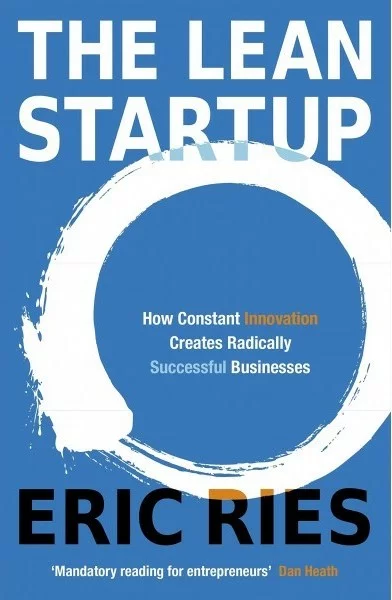At a Glance
Title: The Lean Startup
Target Audience: Entrepreneurs, startup founders, businesspeople, and innovators
Topic: A novel approach to business startups and product development that minimizes the risk of failures.

Author: Eric Ries
Language: English
Pages: 299
Price: approx. 35 Euros (hardcover) | approx. 12 – 13 Euros (paperback edition)
Pros: Innovative approach to business startup, dealing with uncertainty in startups, concept of Minimum Viable Product (MVP), “Build-Measure-Learn” feedback loop, emphasizes “validated learning”, rapid scientific experiments, and a series of counterintuitive practices to shorten product development cycles.
Cons: Often used as an excuse for underfunded projects, risk of immature products, criticism of wasteful spending, too much focus on MVP without quality assurance.
Buy: Amazon
In Detail
“The Lean Startup” by Eric Ries is a groundbreaking work that has revolutionized the way startups and businesses develop and launch products. It introduces a systematic, scientific approach to creating and managing successful startups in an era when companies with innovative ideas must act faster than ever before.
At the core of “The Lean Startup” is the idea that in today’s fast-paced business world, traditional, lengthy development processes often no longer suffice. Ries presents an approach that encourages companies to develop products quickly and bring them to market to gather genuine customer feedback. But this approach wouldn’t be possible without a solid data strategy. Ries emphasizes that companies must not only act quickly, but also base their decisions on solid data. He demonstrates how companies can make data-driven decisions through continuous testing, measuring, and adapting. This is crucial for data strategists as it highlights the role of data in modern product development. It clarifies that agility alone is not enough; it must be supported by a well-thought-out data strategy to be truly effective.
“The Lean Startup” underscores the need for real-time feedback and data-driven decisions in product development. It is not just a guide for rapid product iterations, but also a manual for data-based decision-making. Ries teaches how to establish data-driven hypotheses, conduct real-world experiments, and analyze the results to constantly refine product development. For anyone looking to develop a data strategy, the book offers valuable insights into the practical application of data in product development.
To illustrate the relevance and applicability of Ries’ approach, let’s take a closer look at some key concepts from the book:
- Minimum Viable Product (MVP): The MVP concept is a key element in Eric Ries’ “The Lean Startup”. An MVP is the simplest version of a product that can be developed to test the market. It has only the essential features to gather customer feedback. This pared-down product allows companies to validate with minimal resources whether there’s an actual demand for the product and which aspects might need improvement. It serves as an efficient tool to validate which product features resonate with customers and which do not.
- Importance of Agility and Rapid Learning: Ries places great emphasis on the ability of startups to learn and adapt quickly. He argues that success doesn’t come from flawless execution of an original plan, but rather from a company’s ability to learn from feedback and adjust its strategy accordingly. In a constantly changing market environment, the speed of learning is often more valuable than the perfection of the first product attempt.
- “Build-Measure-Learn” Feedback Loop: This concept is the backbone of the Lean Startup approach. It suggests that companies should first build an idea or product (“Build“), then measure its performance and market acceptance (“Measure“), and finally learn from the collected data (“Learn“). These insights are then incorporated into the next iteration of the product. This cyclical process facilitates continuous improvement and adaptation to customer needs.
- Challenges and Risks for Startups: Ries sheds light on the numerous challenges startups face. One of the biggest dangers is investing significant time and financial resources in a product that ultimately doesn’t meet customer needs. He underscores the need to learn from mistakes and, if necessary, pivot quickly – a process he calls “Pivot”. A “Pivot” might mean changing the product, the business model, or the target market based on what’s been learned from past experiences.
The concepts introduced in the book are not just theories. Ries draws on his own experiences as a founder and incorporates numerous real-world case studies to demonstrate the efficacy of the Lean Startup approach. He showcases how renowned companies like Dropbox and Airbnb employed the Lean Startup approach to validate and scale their business models.
In conclusion, “The Lean Startup” is not just a must-read for aspiring entrepreneurs but also a valuable manual for established businesses wanting to stay competitive in the modern business landscape. It offers a robust, data-centric method of product development that’s indispensable in today’s data-driven world.
This text was created with the help of ChatGPT.

